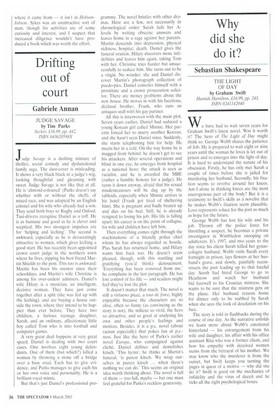Drifting out of court
Gabriele Annan
JUDGE SAVAGE by Tim Parks Secker, £16.99, pp. 442, ISBN 043620598X Judge Savage is a dashing mixture of thriller, social comedy and dysfunctional family saga. The dust-cover is misleading. It shows a very black black in a judge's wig, looking thoughtful and gleaming with sweat. Judge Savage is not like that at all. He is 'almond-coloured' (Parks doesn't say whether with or without the shell), of mixed race, and was adopted by an English colonel and his wife who already had a son. They send both boys to Rugby and Oxford. Taxi-drivers recognise Daniel as a toff. He is as humane and good as he is clever and sceptical. His two strongest impulses are for 'helping and leching'. The second is awkward, especially as he is devastatingly attractive to women, which gives leching a good start. He has recently been appointed crown court judge in the northern town where he lives, pipping his best friend Martin Shields to the post. This too is awkward: Martin has been his mentor since their schooldays, and Martin's wife Christine is among his over-ardent admirers. Daniel's wife Hilary is a musician, an intelligent, decisive woman. They have just come together after a split (she was fed up with the leching), and are buying a house outside the town, where they intend to be happier than ever before. They have two children, a furious teenage daughter. Sarah, and an ordinary, affectionate little boy called Tom who is into football and computer games.
A very great deal happens at very great speed. Daniel is dealing with two court cases. One involves eight young defendants. One of them (hut which?) killed a woman by throwing a stone off a bridge over a busy road. Each has to give evidence, and Parks manages to give each his or her own voice and personality. He is a brilliant vocal mimic.
But that's just Daniel's professional pro
gramme. The novel bristles with other dramas. Here are a few, not necessarily in chronological order: Sarah fails her Alevels by writing obscene answers and leaves home in a rage against her parents. Martin descends into depression, physical sickness, hospital, death. Daniel gives the funeral oration. Hilary discovers more infidelities and leaves him again, taking Tom with her. Christine tries harder but unsuccessfully to seduce him. She turns out to be a virgin. No wonder: she and Daniel discover Martin's photograph collection of paedo-pics. Daniel consoles himself with a prostitute and a crown prosecution solicitor. There are money problems about the new house. He moves in with his facetious, déclassé brother, Frank, who runs an antiques stall with his gay partner.
All this is interwoven with the main plot. Seven years earlier, Daniel had seduced a young Korean girl called Minnie. Her parents forced her to marry another Korean, and she hasn't seen Daniel since. Suddenly, she starts telephoning him for help. He meets her in a café. On the way home he is mugged from behind: he doesn't get to see his attackers. After several operations and blind in one eye, he emerges from hospital as a national hero: the attack is seen as racialist, and he is awarded the MBE (rather a humble honour for a judge). He turns it down anyway, afraid that his sexual misdemeanours will be dug up by the tabloids, especially when Minnie arrives in his hotel (Frank got tired of sheltering him). She is pregnant and badly beaten up and dies on his bed. Still, he is already resigned to losing his job. His life is falling apart: his career is on the point of collapse, his wife and children have left him.
Then everything comes right through the machinations of a friendly police chief whom he has always regarded as hostile. Plus Sarah has returned home, and Hilary wants him back too. He doesn't seem pleased, though, with this startling and gratifying (you'd think) denouement. 'Everything has been removed from me,' he complains in the last paragraph. He has lost control of his life — and readers might feel they've lost the plot.
It doesn't matter that much. The novel is still a virtuoso piece, a tour de force, highly enjoyable because the characters are so alive, often so funny (as convincing as the story is not), the milieus so vivid, the hero so attractive, and so good at analysing his own and other people's feelings and motives. Besides, it is a p.c. novel (about racism especially) that pokes fun at p.c.ness. Just like the hero of Parks's earlier novel Europa, who campaigned against cliché, Daniel defines and demolishes kitsch. 'This hymn', he thinks at Martin's funeral, 'is purest kitsch. We wrap ourselves in purest kitsch ... when there's nothing we can do.' This seems an original idea worth thinking about. The novel is full of them — too full, maybe — but one must feel grateful for Parks's reckless generosity.


































































 Previous page
Previous page